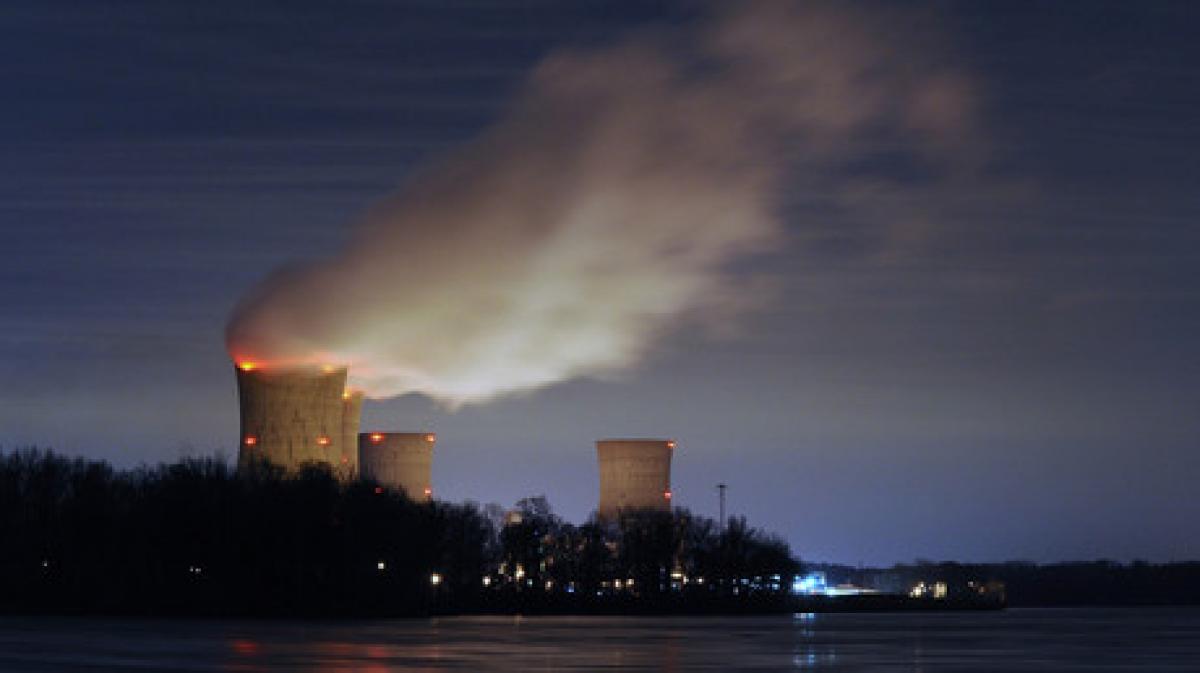Live
- Layering With Essentials Hoodie for Cozy and Chic Outfits
- Chanchalguda Jail Officials Say They Haven't Received Bail Papers Yet, Allu Arjun May Stay in Jail Tonight
- BJP leaders present evidence of illegal voters in Delhi, urge EC for swift action
- Exams will not be cancelled: BPSC chairman
- Nagesh Trophy: Karnataka, T.N win in Group A; Bihar, Rajasthan triumph in Group B
- YS Jagan condemns the arrest of Allu Arjun
- Economic and digital corridors to maritime connectivity, India and Italy building vision for future, says Italian Ambassador
- SMAT 2024: Patidar's heroics guide Madhya Pradesh to final after 13 years
- CCPA issues notices to 17 entities for violating direct selling rules
- Mamata expresses satisfaction over speedy conviction in minor girl rape-murder case
Just In

And plans to build two more nuclear reactors -- first announced in 2009 -- are essentially on hold for at least four years, according to filings with the state\'s Public Service Commission.
A gray dinosaur statue outside south Florida's largest power plant is meant to symbolize two decommissioned fossil fuel reactors, but it also could be seen to represent a nuclear industry crumpling under mounting costs. Almost a decade ago, Turkey Point was aiming to become one of the country's largest nuclear plants. Florida Power and Light had argued that such expansion was needed to maintain diverse energy sources and to supply Florida's booming population for years to come, while touting nuclear as a clean form of energy.
But now, just three reactors are in operation - one natural gas and two nuclear reactors, built in the 1970s.
And plans to build two more nuclear reactors -- first announced in 2009 -- are essentially on hold for at least four years, according to filings with the state's Public Service Commission.
"Right now our only focus is on getting all the approvals we need," company spokesman Peter Robbins told AFP.
"We are not buying construction materials."
Westinghouse bankruptcy
Earlier this year, the bankruptcy of Westinghouse, builder of the AP1000 reactor -- the model scheduled for use at plants in South Carolina and Georgia as well as Turkey Point -- rattled the industry.
Both projects are now years behind schedule and billions of dollars over budget.
"We are very closely monitoring the two new nuclear projects going on," Robbins said.
The Southern Alliance for Clean Energy estimates that construction on Turkey Point has been delayed until 2028 at the earliest, with costs expected to balloon to over $20 billion.
FPL has refused to publicly revise its projections at Turkey Point, for now.
"We don't think there is value in coming up with a new cost or schedule until those reactors are closer to completion," Robbins said.
Controversial project
The project has been controversial from the start, and casts the spotlight on wider concerns about nuclear power.
Critics have pointed to the rising seas from climate change, risks of storm surge, radioactive waste and threats to drinking water and wildlife at the site, nestled near Everglades National Park, as reasons to stop nuclear expansion.
Complaints have also centered on the difficulty of evacuating the densely populated area around the plant in case of emergency. Miami-Dade County is home to 2.6 million people.
"Investing tens of billions of dollars on a power plant that will be underwater one day, along with the highly radioactive waste it will produce, makes no sense," said fishing captain Dan Kipnis, one of the activists who is fighting to stop the project.
Legal challenges to the plant's planned expansion began in 2010, and continued this month with a hearing before the Atomic Safety Board.
Over the course of the two-day hearing, environmental scientists and lawyers wrangled over whether the porous limestone in Florida could really contain wastewater injected underground, without allowing toxic chemicals to seep upward into drinking water.
Currently, Turkey's Point's two nuclear reactors use a series of cooling canals to treat wastewater.
These canals were confirmed last year to be leaking into a nearby national park, after a radioactive isotope, tritium, was found at up to 215 times the normal levels in the waters of Biscayne Bay.
The three-judge safety board panel is expected to rule by year's end on whether an operating license should be granted by the Nuclear Regulatory Commission (NRC).
Time never came
Throughout Florida, FPL is expanding its solar installations, and is shuttering coal plants.
Its energy mix is 70 percent natural gas, 17 percent nuclear, with the rest divided between solar, oil and coal.
Meanwhile, the ever-dropping cost of natural gas is making nuclear less attractive every day, analysts say.
"Most people think Turkey Point will never get built," said Mark Cooper, senior research fellow at the Institute for Energy and the Environment, Vermont Law School, referring to FPL's proposed two new nuclear reactors.
"It turns out it was not the environmentalists, it was not the lawsuits," Cooper told AFP.
"They could not deliver a safe, economically viable product. They couldn't do it in the '80s and they can't do it today," said Cooper.
"Nuclear power is a technology whose time never came."

© 2024 Hyderabad Media House Limited/The Hans India. All rights reserved. Powered by hocalwire.com







